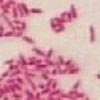- Bacteroides, the best studied, comprise the majority of
microbes inhabiting the human digestive tract. They are rod-shaped,
gram-negative and either mobile or non-mobile. Some are pathogens.
Most are beneficial. In the human intestine the Bacteroides help with
the absorbtion of carbohydrates and proteins, and the biotransformation
of bile and steroids. They get carbon and energy in return.
- Flavobacteria (and the Cytophaga) can
move rapidly by a mysterious process called 'gliding'. Found in soils
and mud, they convert organic molecules to minerals and can break
down cellulose. Many cause a number of fish diseases.
- Sphingobacteria are rod-shaped gram-negative bacteria found
in soil, plants, and water.
- Flexibacter, a fish pathogen, grows in white, fuzzy layers.
- Rhodothermus lives in submarine hot springs.
Some species (Bacteroides fragilis, for instance) are opportunistic
human pathogens.
|
